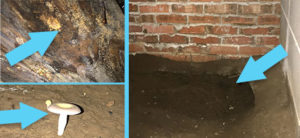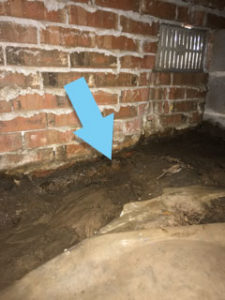Crawl Space Problems
A properly sealed and up-kept crawl space is essential to a comfortable, efficient and healthy home. When neglected, the space beneath your home can develop problems ranging from an unpleasant odor to full blown structural concerns as floor joists rot. These problems frequently reveal themselves long before they become serious. As a homeowner, you should keep an eye out for: mold, rotting wood, dank or musty odors, warping hardwood floors, high humidity, high utility bills, and condensation build-up on duct work, insulation, or water pipes.

What causes crawl space concerns? Typically, water infiltration under the home due to aging construction or poor grading is the culprit. Most off-grade homes have concrete block walls for foundation. As your home ages, the waterproofing on the foundation begins to fail. Standing water on the outside of the home leaks straight through these concrete blocks, which are very porous, and spills into the crawl space. In some cases the freezing and thawing process creates cracks in the foundation. This allows water to flow freely under your home.

There are several signs to look for when identifying potential crawl space problems, including:
- Crawl space floor is below outside soil grade level
- Standing water against the exterior foundation wall
- Foundation cracks
- Canyons and trenching under the home indicating running water
- Buckled hardwood floors
- Soft spots in your floor indicating a failing sub-floor
- Elevated wood moisture content (Greater than 13%)
- Calcium lines on your foundation wall and piers indicating standing water level
Crawl Space Repair Options
Closed Cell Foam: Sub-Floor Application
Pros:
- Closed cell foam is a vapor barrier.
- Will insulate your home, thus preventing cold floors in the winter.
- Closed cell foam is as hard as concrete. It will add a lot of structural strength to your floor system (no more squeaky sub-floor).
- It is waterproof. Even if your home floods, the foam will not have to be removed like other materials such as fiber glass.
Cons:
- Sub-floor applications of closed cell foam may void your termite bond. Be sure to check with your bonding company before any foam install!
- It is permanent. Future changes to home layout will be difficult with closed cell foam on the sub-floor.
- Spraying the sub-floor will lock in the existing moisture, and therefore increase the time it takes for cupped floors to lay down.
- Does not address crawlspace drainage.
- Floor joist are still exposed to crawlspace moisture.
Basic Vapor Barrier System: Open Crawl Space System
Pros:
- Inexpensive relative to closed cell foam applications and encapsulation.
- Effective for mild water infiltration concerns.
Cons:
- Vapor barrier not permanent.
- Ineffective for crawlspaces with extensive moisture and water pooling.
- Does not address the crawlspace air humidity level.
- Vulnerable to pest and rodents.
- Does not address foundation drainage.
Full Encapsulation
Pros:
- Addresses the drainage, moisture, and humidity concerns.
- Is a permanent fix.
- Improvement of air quality.
- No termite bond concerns.
- Conditioned storage under home.
Cons:
- Expensive. A full encapsulation, especially those requiring french drains, is very labor intensive.
Contact Eco Three
Eco Three offers crawl space repair services in the Birmingham and Gulf Coast regions of Alabama and Florida. Give us a call at 205-314-3500 (Birmingham) or 251-615-1330 (Gulf Coast) or at our new location in the Emerald Coast at 850-389-5681, or contact us using the form below!